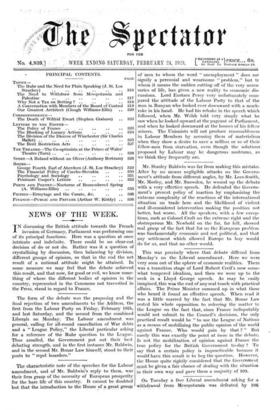This was precisely where that debate differed from Monday's on
the Liberal amendment. Here we were very soon out of the sphere of economic realities. There was a transition stage of Lord Robert Cecil's now some- what tempered idealism, and then we were up to the neck in a Lloyd George speech. As may be easily imagined, this was the end of any real touch with pilactical affairs. The Prime Minister summed up in what those who heard it found an effective speech. When read it was a little marred by the fact that Mr. Bonar Law rested his whole opposition to referring the matter to the League on the fact that, since France indisputably would not submit to the Council's decisions, the only practical result would be " to use the League of Nations as a means of mobilizing the public opinion of the world against France. , Who would gain .by that ? " But surely this was exactly the point at issue in the debate. Is not the mobilization of opinion against France the true policy for the British Government to-day ? To say that a certain policy is impracticable because it would have this result is to beg the question. However, the House quite rightly-considered that the Government must be given a fair chance of dealing with the situation in their own way and gave them a majority of 109.










































